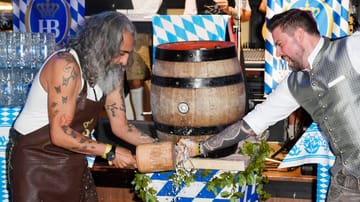The persistent drought is causing problems for the soil, and the next hot summer seems certain. Germany’s breweries have to give in to save their recipes.
Hops are one of Germany’s top exports, with a third of the world harvest coming from Bavaria. But the farmers in the more than 1,000-year-old growing regions of the Federal Republic are facing an unprecedented challenge: the climate crisis threatens to destroy their livelihoods – and with it the future of German beers.
Because it doesn’t matter whether it’s Pils, Kölsch, Helles or wheat beer: it doesn’t work without hops. The constantly increasing number of hot days and hours of sunshine, the increasingly unpredictable rainfall and the growing problem of drought are increasingly calling the previous recipes into question.
“Hop is exposed to the extreme weather practically all summer long. Older varieties in particular suffer greatly from this because they were selected centuries ago under completely different climatic conditions,” says Anton Lutz, breeder at the Hop Research Center in Hüll in the oldest growing region in the republic, Upper Bavaria Hallertau.
Last year, hop farmers had to shoulder almost a third of the harvest losses, with the particularly susceptible old hop varieties – the most important ingredient for the bitter traditional beers – almost half of the harvest was lost in some cases.
Drought stress destroys the most important taste property
The problem: hops grow quickly and are relatively thirsty. In years of drought, this becomes his undoing. Many plants die due to a lack of sufficient irrigation – nationwide only around 20 percent of the hop-growing areas can be artificially irrigated.
Despite mostly water-saving drip irrigation, the quotas approved by the water management authorities are not enough when long periods of heat and drought hit. In addition, there are more pests such as spider mites or the so-called hop flea, which feel particularly comfortable when temperatures rise.
If plants of the old varieties survive all this, their quality at the time of harvest in September is still severely restricted, explains expert Lutz. The drought stress reduces the bitter substances in the plant and breweries need twice the amount to get the beer taste they are used to.
“With the high demands of our customers on the beer quality, the effects on the end product due to the extremely high effort involved in malting and brewing must be kept as low as possible,” complains Holger Eichele, General Manager of the German Brewers’ Association.
To a certain extent, the problem can be offset by inventories from better years – for now. According to forecasts by meteorologists and climate researchers, the coming summers will be even hotter and drier. The only real solution seems to lie in the lab.
New varieties still arouse skepticism
That’s why Anton Lutz and his colleagues are working on new varieties at the Hop Research Center. The team is one of the world’s top hop breeders and aims to make the bride future-proof with more climate-resistant variants. “The newer the varieties, the less they react to these extreme conditions,” says Lutz. Ideally, the new hop varieties are more heat-resistant, require less watering, are better protected against pests and are accepted by farmers and breweries alike. However, the latter is not easy.
The brewers in particular are considered to be reluctant to change in the industry, especially when it comes to aroma hops. This ensures the finer flavors at the end of the brewing process. “The brewers are very cautious because they are always afraid that the overall impression of the beer will change and the consumers will not accept that,” says hop breeder Lutz.
The concern is particularly great that traditional German beers could become too fruity. Before accepting a new type of aroma, every brewery insists on extensive series of tests over several years in order to rule out major deviations in taste and to adapt their own recipes.
“And when favorable years come again and the old varieties grow well again, some of the brewing attempts disappear again,” says Anton Lutz. He considers this approach to be risky: “New breeds offer the only way to adapt to the future challenges of climate change. In the long term, brewers will not be able to avoid changing their varieties.”


